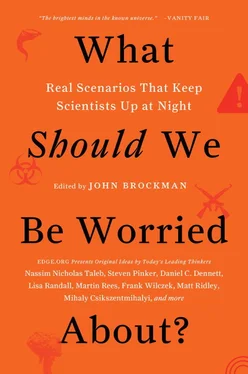This is wonderful, mostly. Religious institutions that could always rely in the past on the relative ignorance of their flock must now revise their proselytizing and indoctrinating policies or risk extinction. Dictators face the dire choice between maximal suppression—turning their nations into prisons—or tolerating an informed and well-connected opposition. Knowledge really is power, as people are coming to realize all over the world.
This leveling does give us something new to worry about, however. We have become so dependent on this technology that we have created a shocking new vulnerability. We really don’t have to worry much about an impoverished teenager making a nuclear weapon in his slum; it would cost millions of dollars and be hard to do inconspicuously, given the exotic materials required. But such a teenager with a laptop and an Internet connection can explore the world’s electronic weak spots for hours every day, almost undetectably at almost no cost and very slight risk of being caught and punished. Yes, the Internet is brilliantly designed to be so decentralized and redundant that it’s almost invulnerable, but robust as it is, it isn’t perfect.
Goliath hasn’t been knocked out yet, but thousands of Davids are busily learning what they need to know to contrive a trick that will even the playing field with a vengeance. They may not have much money, but we won’t have any either, if the Internet goes down. I think our choice is simple: We can wait for them to annihilate what we have, which is becoming more likely every day, or we can begin thinking about how to share what we have with them.
In the meantime, it would be prudent to start brainstorming about how to keep panic at bay if a long-term disruption of large parts of the Internet were to occur. Will hospitals and fire stations (and supermarkets and gas stations and pharmacies) keep functioning, and how will people be able to get information they trust? Cruise ships oblige their paying customers to walk through a lifeboat drill the first day at sea, and while it isn’t a popular part of the cruise, people are wise to comply. Panic can be contagious, and when that happens, people make crazy and regrettable decisions. As long as we insist on living in the fast lane, we should learn how to get on and off without creating mayhem.
Perhaps we should design and institute nationwide lifeboat drills to raise consciousness about what it would be like to have to cope with a long-term Internet blackout. When I try to imagine what the major problems would be and how they could be coped with, I find I have scant confidence in my hunches. Are there any experts on this topic?
SAFE MODE FOR THE INTERNET
GEORGE DYSON
Science historian; author, Turing’s Cathedral: The Origins of the Digital Universe
Sooner or later—by intent or by accident—we will face a catastrophic breakdown of the Internet. Yet we have no Plan B in place to reboot a rudimentary, low-bandwidth emergency communication network if the high-bandwidth system we’ve come to depend on fails.
In the event of a major network disruption, most of us will have no idea what to do except to try and check the Internet for advice. As the system begins to recover, the resulting overload may bring that recovery to a halt.
The ancestor of the Internet was the store-and-forward punched-paper-tape telegraph network. This low-bandwidth, high-latency system was sufficient to convey important messages, like “Send ammunition” or “Arriving New York Dec. 12. Much love. Stop.”
We need a low-bandwidth, high-latency store-and-forward message system that can run in emergency mode on an ad-hoc network assembled from mobile phones and laptop computers even if the main networks fail. We should keep this system on standby and periodically exercise it, along with a network of volunteers trained in network first aid the way we train lifeguards and babysitters in CPR. These first responders, like the amateur radio operators who restore communications after natural disasters, would prioritize essential communications, begin the process of recovery, and relay instructions as to what to do next.
Most computers—from your car’s engine controller to your desktop—can be rebooted into safe mode to get you home. But no safe mode for the Internet? We should be worried about that.
THE FRAGILITY OF COMPLEX SYSTEMS
RANDOLPH NESSE
Professor of psychiatry & psychology, University of Michigan; coauthor (with George C. Williams), Why We Get Sick
On the morning of August 31, 1859, the sun ejected a giant burst of charged particles. They hit Earth eighteen hours later, creating auroras so bright that at 1:00 A.M. birds sang and people thought morning had dawned. Currents induced in telegraph wires prevented transmission, and sparks from the wires set papers aflame. According to data from ice cores, solar ejections this intense occur about every 500 years. A 2008 National Academy of Sciences report concluded that a similar event now would cause “extensive social and economic disruptions.” Power outages would last for months, and there would be no GPS navigation, cell phone communication, or air travel.
Geomagnetic storms sound like a pretty serious threat. But I am far less concerned about them than I am about the effects of many possible events on the complex systems we have become dependent on. Any number of events that once would have been manageable now will have catastrophic effects. Complex systems like the markets, transportation, and the Internet seem stable, but their complexity makes them inherently fragile. Because they are efficient, massive complex systems grow like weeds, displacing slow markets, small farmers, slow communication media, and local information-processing systems. When they work, they are wonderful, but when they fail, we will wonder why we did not recognize the dangers of depending on them.
It would not take a geomagnetic storm to stop trucks and planes from transporting the goods that make modern life possible; an epidemic or bioterrorist attack would be sufficient. Even a few decades ago, food was produced close to population centers. Now world distribution networks prevent famine nearly everywhere—and make mass starvation more likely if they are disrupted suddenly. Accurate GPS has been available to civilians for less than twenty years. When it fails, commuters will only be inconvenienced, but most air and water transport will stop. The Internet was designed to survive all manner of attacks, but our reckless dependency on it is nonetheless astounding. When it fails, factories and power stations will shut down, air and train travel will stop, hospitals and schools will be paralyzed, and most commerce will cease. What will happen when people cannot buy groceries? “Social chaos” is a pallid phrase for the likely scenarios.
Modern markets exemplify the dangers of relying on complex systems. Economic chaos from the failures of massively leveraged bets is predictable. That governments have been unable to establish controls is astonishing, given that the world economic system came within days of collapse just five years ago. Complex trading systems fail for reasons that are hard to grasp, even by investigations after the fact. The Flash Crash of May 6, 2010, wiped out over a trillion dollars of value in minutes, thanks to high-frequency trading algorithms interacting with one another in unpredictable ways. You might think this would have resulted in regulations to prevent any possibility of reccurrence, but mini-flash crashes continue and the larger system remains vulnerable.
These are examples because they have already happened. The larger dangers come from the hidden fragility of complex systems. James Crutchfield, of the Complexity Sciences Center at UC Davis, has written clearly about the risks, but as far as I can tell few are paying attention. We should. Protecting us from catastrophes caused by our dependency on fragile complex systems is something governments can and should do. We need to shift our focus from this or that threat to the vulnerabilities of modern complex systems to any number of threats. Our body politic is like an immune compromised patient, vulnerable to collapse from numerous agents. Instead of just studying the threats, we need scientists to study the various ways that complex systems fail, how to identify those that make us most vulnerable, and what actions can prevent otherwise inevitable catastrophes.
Читать дальше












